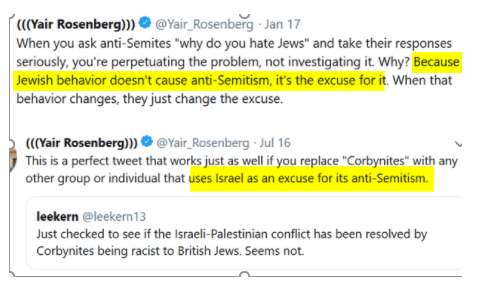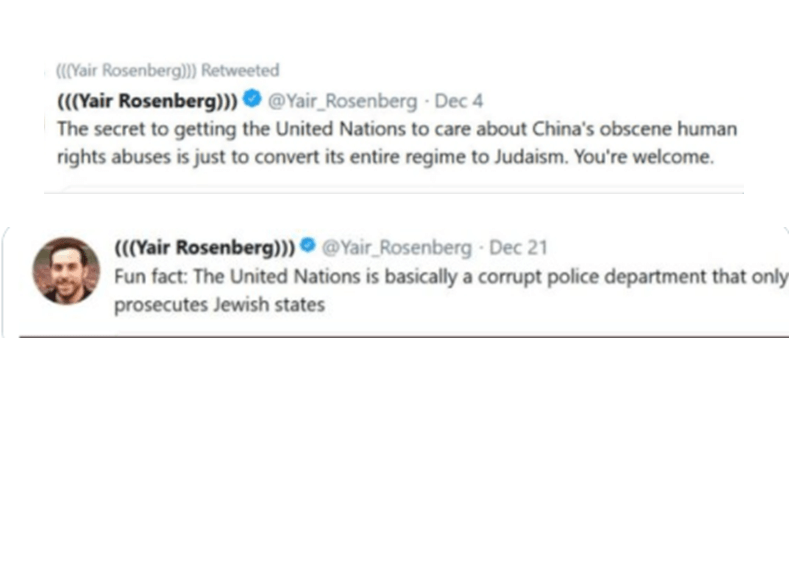Yair Rosenberg, a writer at Tablet magazine, has come out with an explainer series on antisemitism. It’s important that people recognize that his views on antisemitism are not shared by academics and scholars. They are an expression of what I call hasbara culture– a social construction of alternative reality which centers on the victimization of the Jewish people that has little to do with the real world. But despite hasbara culture’s ideas being ahistorical, its concepts and discourse on Jew hatred are now conventional wisdom in Jewish and American political culture.
In explaining antisemitism, Rosenberg quotes a 2015 exchange between journalist Diane Rehm and Bernie Sanders.
Rehm states that Sanders has “dual citizenship with Israel,” and Sanders corrects her. “No I do not…”
Rosenberg claims that in this exchange we should recognize familiar antisemitic themes, going back to the book of Esther. That Rehm for whatever reason thought Sanders has dual citizenship demonstrates that nothing has changed for the Jews over thousands of years of living among the nations.
The non-hasbara culture way to understand the “meaning” of Rehm’s assumption is to think of Rehm’s perspective and wonder why she believed Sanders had dual citizenship. Perhaps it would make sense to ask her. Who knows? Maybe Sanders being in a kibbutz in the 60’s gave her that impression as strange as it strikes us. But Rosenberg doesn’t spend much time wondering where Rehm got her idea. Hasbara culture has no need for Rehm, because antisemitism experts will reveal the “larger meaning” of her mistake, a meaning much greater than what was actually going on in Rehm’s head.
The conclusion Rosenberg draws from this and another meaningless episode is that the left has a problem of using ancient tropes against Bernie Sanders. That the left believes he is secretly loyal to Israel.
To understand how removed from reality this view is, compare that hasbara culture fantasy with who in the real world is using antisemitic tropes against Bernie Sanders. Just behold Rosenberg’s hasbara culture ally Dennis Prager’s 2016 column “Bernie Sanders, the Non-Jewish Jew and Non-American American.” Sanders’s “rootlessness” is the problem.
“Cut off from his own roots, he wants others to be alienated, too.”
“If you want to understand Bernie Sanders, this is what you need to know: He is the quintessential modern identity-free man. He is a non-Jewish Jew and a non-American American.”
And it doesn’t get any less antisemitic from there. Prager makes sure to cover every antisemitic trope about the rootless Jew.
“Bernie Sanders is a milder version of these radical non-Jewish Jews. He, too, is alienated from his Jewish and American origins. And that explains his attitudes and policies: People with no national or religious roots who become politically active frequently seek to undermine the national and religious identities of others, especially those in their own national and religious group. In the case of Sanders, that means Jewish and American identities.”
That this article got zero attention while Rosenberg is convinced that Diane Rehm is Haman from the bible tells you how Orwellian the antisemitism discourse really is.
Prager’s antisemitic rant reminds us that in the real world it is hasbara culture journalists who cultivate hatred against their ideological opponents by any means necessary, including antisemitism.
Just look at Jeffrey Goldberg’s insinuations about Bernie Sanders.

The trope that Sanders is a “stab in the back-self-hating Jew” is the one that dominates American political culture, not that he’s Benjamin Netanyahu’s sleeper agent.
Take the question whether the assorted trope and canard violations by Rep. Ilhan Omar, a punching bag of hasbara culture, demonstrate that she is an antisemite. Here again Rosenberg invokes his supposed antisemitism expertise to speak for the Jews.

He writes “we Jews.” And again he is incorrectly interpreting 21st century America using “centuries of hard experience in spotting this stuff.” Seth Ackerman dispenses of Rosenberg’s expertise in an excellent piece called “Ilhan Omar Is Not Antisemitic.”
[A] a chorus of online voices immediately popped up to insinuate that because they, as Jews, personally found Omar’s words to be offensive, their verdict was final and it was bigoted for anyone to question it.
I have been Jewish for roughly as many years as any of these writers, and I could cite equally harrowing family stories. But I didn’t view Omar’s comments as antisemitic; neither did [Paul] Waldman, who noted in his analysis that he was “raised in an intensely Zionist family with a long history of devotion and sacrifice for Israel.” Waldman and I could be wrong about Omar’s comments, but then so could her Jewish critics. The mere fact of being Jewish evidently can’t decide the issue.
But Seth Ackerman has far less influence over mainstream media than Rosenberg. And What starts with Rosenberg’s hasbara culture misreads speaking for the Jews ends up with Omar and Tlaib being slandered by Jake Tapper on national television. Now here is a question to ponder. Who are the “haters” in this story? Omar and Tlaib or Rosenberg and Tapper?
According to hasbara culture, those with animus towards Jews throughout history are all infected with the same disease. So, when “anti-Israel” politicians like Hank Johnson, Ilhan Omar and Rashida Tlaib are caught using “tropes,” what it does is merely “confirm” the antisemitism of the already assumed guilty suspect. Because their criticisms of Israel’s malfeasance already makes them suspect.
Why such keen interest in the world’s only Jewish state? the hasbara culturists ask.
Of course, In the real world all these good people are guilty of nothing. If we only asked them what they meant when they said what they said, there would be no antisemitism controversies. It would be obvious to all they meant no harm to Jews when supposedly committing their trope and canard violation, though there would be a lot of questions about Israel’s conduct.
Just listen to how authentic and generous is Omar’s apology to hasbara culture:
It’s now apparent to me that I spent lots of energy putting my 2012 tweet in context and little energy i[n] disavowing the anti-semitic trope I unknowingly used, which is unfortunate and offensive.
It is only from hasbara culture’s distorted perspective that Omar is a Jew baiter and hater.
But we don’t live in the real world. In all my examples hasbara culture journalists and the likes of Jonathan Greenblatt of the ADL assume the authority to interpret the “meaning” of the trope violation– and the mainstream grants them that authority.
Now let’s take a broader look at hasbara culture’s understanding of antisemitism and a more objective one. Judith Butler in her review of Bari Weiss’s book “How to Fight anti-Semitism” frames the “hasbara culture” view of Jew hatred this way:
Weiss often uses epidemiological language to understand antisemitism: it is a “thought virus,” an “intellectual disease,” an “ancient malady,” “a cancer.” As such, antisemitism seems to exist outside history…
What does it mean that antisemitism exists “outside history?” It means we ignore the precise circumstances of the supposed antisemitism. For instance why not ask why it is that Rehm thought Sanders had dual citizenship. Certainly he lived in Israel for a time. Instead, hasbara culture connects Rehm’s confusion to what the Israeli scholar Ilan Peleg calls the “anti-Semitic being” that exists “outside history.”
“There is a frequent dominant tendency [inside Israel] to collapse these victimizers into one symbolic and simplistically a-historic anti-Semitic “being.””:
To put it crudely, there is a sense in Israeli collective victim-hood that all the traditional enemies of the Jewish people are in the final analysis one and the same. Regardless of the specific circumstances under which they have appeared on the stage of history and regardless of the specifics of their interactions with Jews.
Pharaoh = Haman = Acashverosh = Khmelnsytsky = Hitler = the mufti of Jerusalem = Yasir Arafat [=Rashida Tlaib, etc]
These historic figures are conceptually indistinguishable within the paradigm of Israeli collective victim-hood. There is a frequent dominant tendency to collapse these victimizers into one symbolic and simplistically a-historic anti-Semitic ‘being.’
When Tlaib and Omar are accused of being antisemites they are simply the latest manifestations of this “a-historical anti-Semitic being.”
The hasbara culture journalists I write about are the leading experts of this supposed “anti- Semitic being” that exists outside history. What they do is connect people in the 21st century with ancient hatreds against the Jews. And hasbara culture’s ideological goal is to connect all antisemitisms and all antisemites to each other. And it is this Jewish victimhood that has become the dominant Jewish identity today.
The scholars’ approach to Jew hatred is the very opposite of hasbara culture’s. They isolate incidents from each other and only then can they determine what’s in common between them. Thanks to Rosenberg and his hasbara culture progenitors there are antisemitism scholars who refuse to even use that term “antisemitism.” They believe the word has lost all meaning:
“Instead of resorting to using the term ‘antisemitism,’ I trained myself to aim for detailed depictions of specific incidents and figures” says Professor David Engel, a scholar of modern Jewish history.
Engel makes it a point that Jews exist in history. He asks:
Is there really a connection between things like Christian hostility towards Jews in ancient times; the expulsion of Jews and denial of their rights; blood libels against Jews in medieval times; boycotts of Jewish businesses in the modern age; propagation of the belief that Jews have undue influence on the world economy; restricting Jewish immigration; the murder of Jews by the Nazis and their collaborators during the Holocaust; vandalism of Jewish cemeteries; and calls for boycotts of Israel and denying Israel’s right to exist[?]
Yair Rosenberg and hasbara culture’s answer to this question is a resounding: YES! In fact, their whole ideological project is to make those connections.
In his series Rosenberg “proves” Israel can’t provoke Jew hatred by its actions. Why? Because the narrator proclaims that “antisemitism” existed before the state of Israel did. So, how can Israel cause antisemitism, this tortured logic goes, if the problem existed before Israel! This of course makes no sense to the rest of us, but it does to hasbara culture.
In the real world only hasbara culture true believers don’t recognize: that the state of Israel’s behavior is an engine of antisemitism.
It can’t be emphasized enough how these hasbara culture’s ideas about antisemitism shape the way people, especially Jews understand the world. While outsiders might view this Rosenberg series as an exhibit of ethnocentric innocence, it is far more dangerous than that.
Look what happened when Kenneth Roth retweeted a 2014 NYT article headlined “Germans Rally to Protest Anti-Semitism Over Gaza War”. Roth summed up the article:
Germans rally against anti-Semitism that flared in Europe in response to Israel’s conduct in Gaza war. Merkel joins.
For most of us there is nothing remarkable about this tweet of the NYT article. In the real world when Israel rains hatred and destruction on Gaza, of course Muslims and Palestinians and their friends the world over would be enraged. In the real world Israel’s behavior enrages people (often even me).
But Jeffrey Goldberg was swift to denounce Roth in an ideological way. He wrote a whole article about the tweet, and said:
Does Human Rights Watch Understand the Nature of Prejudice?
A powerful advocate appears to believe that anti-Semitism is sparked in part by Jewish behavior.
Goldberg found “Roth’s framing,” “very odd and obtuse.”
Anti-Semitism in Europe did not flare “in response to Israel’s conduct in Gaza,” or anywhere else. This is for the simple reason that Jews do not cause anti-Semitism.
But to a “detached observer” it’s obvious that Israel’s behavior influences antisemitism, as Raphael Magarik wrote in response to Goldberg in the Forward.
[A]s Brooklyn College political scientist Corey Robin noted, in 2002, the esteemed Jewish sociologist Nathan Glazer not only attributed contemporary anti-Semitism to a reaction to Israel, but further claimed, “hostility can be reduced and moderated by [Israel’s] policies.” When you approach anti-Semitism as a detached observer, rather than a polemicist who has a beef with Human Rights Watch, this is obvious.
According to Goldberg’s logic the state of Israel can wipe out whole families with missile strikes in Gaza but when the Gazans hate Israel back, they’re guilty of Jew-hatred. According to this line of reasoning if only more Holocaust classes were taught in Gaza, Hamas would have long ago laid down their arms. Here is Goldberg writing a few months after Israel killed 1500 Palestinians, many of them civilians, in a three-week onslaught:

This is what Butler meant when she wrote of “anti-Semitism being out of history.”
So how does hasbara culture explain the statistical evidence of anti-Israel- antisemitism? Why does antisemitism (incidents and attitudes) spike during and after Israel attacks on Gaza? How are we to make sense when Israel’s behavior results in apparent retaliation against Jews?
The answer to hasbara culture is that those antisemites are merely using Israel as “an excuse” for expressions of bigotry. But being out of history, Israel’s behavior by itself can’t provoke anti-Israel or anti-Jewish feeling. No, that’s already there, like the magma in the volcano, according to Goldberg’s and Rosenberg’s hasbara culture doctrine.
Throughout Rosenberg’s explainer series the Israel-related action that motivates antisemites is always an “excuse,” a cover for the real motive, Jew hatred.
Let’s look at another example of Israel being taken out of history. In the 2016 summer Olympics, an Egyptian wrestler named Islam El Shehaby refused to shake his Israeli opponent’s extended hand, and Bret Stephens then at the Wall Street Journal explained the gesture in an article called, “The Meaning of an Olympic Snub.” The rudeness exposes the “disease of the Arab mind,” Stephens said. It was evidence of the Arab world’s “consuming hatred of Jews.”
But when asked about the snub El Shehaby explained that he was protesting Israel’s treatment of Palestinians.
Now if this same un-sportsmanlike behavior would take place between an Azerbaijani and an Armenian, a Serb and Bosnian, or a Saudi and Iranian etc. it would provoke no head scratching from Stephens. We would all find it perfectly understandable. Competing national, religious, and ethnic narratives lead to heightened passions. But because Israel is experienced as being innocent, it must be the Jews that El Shehaby is protesting.
This “Jewish” misreading of the world has a myriad of terrible consequences which will be further explored in upcoming articles.
But so innocent and out of history is the state of Israel that Rosenberg can’t discern any reason except antisemitism, that, were America to attack Iran, Iran would then attack Israel. Iran would use the attack to “murder a ton of Jews in a totally different country” than the country that attacked it, Rosenberg says.

That Israel has been murdering Iranian scientists on the streets of Tehran and killing its soldiers in Syria is lost on Rosenberg. Remember, according to hasbara culture’s victimhood perspective Israel is always acting in self-defense. And from this ethnocentric vantage point, Iran ought to realize that too. Iran ought to recognize Israel is the victim. Thus, Iran too is using Israel as an excuse for its antisemitism.

And the United Nations too. The U.N.’s preoccupation with Israel has nothing to do with Israel’s behavior. Again, as ever it’s about the Jews.

Again, these ideas have real world consequences. When Human Rights Watch or the U.N. accuses Israel of crimes, Israeli and Jewish political culture can ignore it in good conscience. After all, they’re all using Israel’s human right violations as an excuse for its hatred of the Jews. This victimhood discourse has led to total impunity and immunity by Benjamin Netanyahu and Israel.
And today in Jewish and Israeli political culture demanding Israel follow international law means being on the side of the antisemites, of being on the side of the “anti-Semitic being.” When in 2016 Obama finally took action against illegal settlements by allowing a Security Council resolution to pass condemning the settlements as a “flagrant violation” of international law, it wasn’t about settlements, in the hasbara culture discourse. Rabbi David Wolpe:
Allowing Israel to be condemned in an anti-Semitic forum is at best unproductive and at worst, acquiescence to evil.
More recently, when Ben & Jerry’s announced that they were withdrawing from sales in the illegal settlements, the hasbara culturists said the ice cream makers were submitting to evil.
In the real world critics, opponents, and even enemies of Israel are reacting to events not fantasies of evil as Rosenberg and hasbara culture would have us believe. As the writer Brian Klug puts it:
But Israel’s occupation of the West Bank and Gaza Strip is no fantasy. Nor is the spread of Jewish settlements in these territories. Nor the unequal treatment of Jewish colonisers and Palestinian inhabitants. These are realities. It is one thing to oppose Israel or Zionism on the basis of an anti-Semitic fantasy; quite another to do so on the basis of reality.
That reality is a historical conflict that has generated two sides. “[T]he creation of that Jewish nation planted the seeds of a new conflict that has yet to be resolved,” J.J Goldberg has written in dispensing of the unending antisemitism narrative.
And unlike classical anti-Semitism, which entailed the persecution of a minority for no reason that the victim could control, this new conflict has two active parties, each with claims against the other. The conflict has spillover effects on others around the world, Jews, and Muslims, who identify with one side or the other. It is ugly and getting uglier. But to call it merely a rebirth of the old hatred is to deny that there are two sides to the conflict.
Actually, Israel’s actions exist very much in history, and its supporters use very sharp elbows and knees to get its way. And after nearly a century of conflict it is Israel and Zionism that has celebrated many victories and it’s the Palestinians who have mourned unending losses.
The hasbara culture ideas seen in this article have become sacred. But these sacred cows must be challenged.
The out of history, victimhood perspective does not reflect reality. But that doesn’t stop it from becoming the very essence of Jewish identity today. With these videos on antisemitism under the imprimatur of Tablet, Yair Rosenberg is being given cultural power to interpret the world for the Jews. That should not be allowed to happen.
So where are the Palestinian voices in mainstream media?
Mondoweiss covers the full picture of the struggle for justice in Palestine. Read by tens of thousands of people each month, our truth-telling journalism is an essential counterweight to the propaganda that passes for news in mainstream and legacy media.
Our news and analysis is available to everyone – which is why we need your support. Please contribute so that we can continue to raise the voices of those who advocate for the rights of Palestinians to live in dignity and peace.
Palestinians today are struggling for their lives as mainstream media turns away. Please support journalism that amplifies the urgent voices calling for freedom and justice in Palestine.
 RSS Feed
RSS Feed















 August 28th, 2021
August 28th, 2021  Awake Goy
Awake Goy  Posted in
Posted in  Tags:
Tags: 













